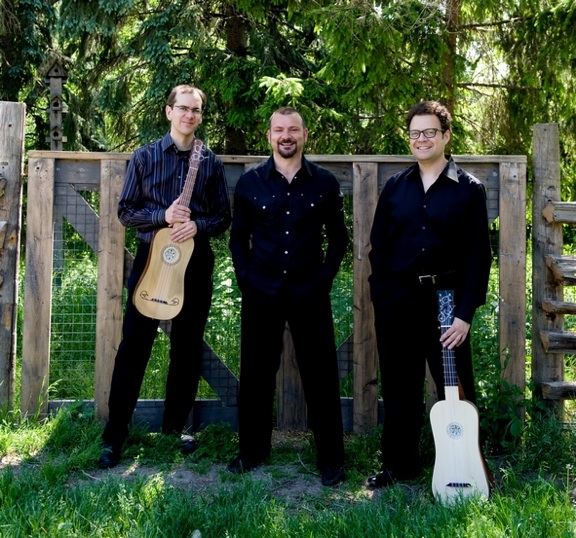
Tafelmusik Baroque Orchestra is bridging the gap between art and folk music as it invites Toronto newcomers Vesuvius Ensemble to its Neapolitan-themed concert programme at Trinity-St Paul’s Centre, starting Thursday night.
- Classical Music 101: What Does A Conductor Do? - June 17, 2019
- Classical Music 101 | What Does Period Instrument Mean? - May 6, 2019
- CLASSICAL MUSIC 101 | What Does It Mean To Be In Tune? - April 23, 2019
Before joining a unified Italy in the 19th century, the Kingdom of Naples was an economic and cultural powerhouse. The city ringing the ever-threatening flanks of volcanic Mt Vesuvius became a hotbed of opera development in the 18th century. Its composers, whose company included Alessandro Scarlatti, also left a rich legacy of sacred and instrumental music.
And then there is the folk music of the surrounding regions of Campania and Apulia, much of which discreetly wound its way into the art music of opera and the church — becoming a sort of invisible current in any great Italian tenor’s repertoire.
Enter native Neapolitan Francesco Pellegrino, who left his home country for Toronto five years ago to teach Italian art song and diction at University of Toronto.
He left Italy for love, and is returning the favour by having become an enthusiastic apostle of the music of his native city. Pellegrino formed Vesuvius Ensemble with Tafelmusik regulars Marco Cera, who plays Baroque guitar, and lute master Lucas Harris.
For this week’s Tafelmusik concerts, the Vesuvians are joined by multi-instrumentalist Ben Grossman and members of the period-instrument orchestra in a programme that mixes Baroque art music — by Scarlatti, Leonardo Leo, Leonardo Vinci, Giovanni Battista Pergolesi and Francesco Durante — with the folk music of Naples and environs.
This is music straight out of an oral tradition going back hundreds of years.
Pellegrino describes how much of this improvised music is linked to the cults associated with seven figures of the Madonna located in shrines located on seven hills surrounding Naples. Each cult has its own distinct musical style — even when the towns are a couple of kilometres apart.
The charismatic, operatically-trained tenor recalls how his parents and relatives would squeeze themselves into a Fiat 1100 every season to go partake in the Madonna festivities. These begin with a sacred procession through the streets, but end on farmers’ fields in all-night revels of music, dancing and song.
Pellegrino’s eyes glow as he describes the ecstatic combination of a crowd carried away on wine and song. “There’s something cathartic about the experience,” he recalls.
It is nearly impossible to translate this sort of party vibe into a formal concert setting, but Pellegrino hopes that he and his fellow Vesuvians’ collective love of the music will at least provide a fair taste of these joyful riches.
The musicians play folk instruments still in regular use around Naples, and Pellegrino sings these songs in a more colloquial voice than would normally hear from an operatic stage.
The singer describes how he began his career at age 8. “It was at a relative’s wedding. One of my loving uncles put me on a table and said, ‘sing!.’ So I sang. That was my début.”
He earned pocket money as a wedding singer until age 14, at which point he decided to get serious about music studies. When he told his parents he wanted to be a singer, his father said, “What are you going to eat? You can’t eat notes!”
But Pellegrino persevered, and his father quickly realised that this was no silly dream. For the first six years, the singer spent every Tuesday and Friday learning the art of Neapolitan art song in a studio right across the way from the city’s legendary Teatro di San Carlo.
He later studied with renowned Italian tenor Carlo Bergonzi and became a regular at Teatro alla Scala in Milan before deciding to leave it behind for unknown prospects in Toronto so that his wife could be closer to her family.
The story of how Pellegrino met his wife sounds like the stuff of Italian film.
He was having a lesson with Bergonzi when the door to the studio opened and a young woman appeared, asking if she could listen in on the class. The teacher abruptly stopped the lesson.
“Bergonzi is a funny, funny man,” Pellegrino smiles. “He saw me staring at the girl, so he came close to me and said, ‘The lesson is over. Go to meet her.’ ”
Getting people in Toronto, a place and a culture so far removed from the sun-drenched shores of the bay of Naples, to fall in love with its ancient artforms is no small task. But Pellegrino doesn’t betray a shred of doubt or worry.
“I love to challenge everything. I quit La Scala to come here for love,” he asserts. “That’s how big my passion is to challenge life.”
+++
The programme runs to Sunday at Trinity-St Paul’s. For more information, including detailed introductions to the performers, instruments and programme notes, click here.
Vesuvius Ensemble is presenting its own concert on Oct. 16 at the Oakville Performing Arts Centre. For more on the Ensemble, click here.
Here is a sample of Pellegrino and Harris at work at Walter Hall last year, performing the villanella “Avrilla mia” by Girolamo Kapsberger:
John Terauds
- Classical Music 101: What Does A Conductor Do? - June 17, 2019
- Classical Music 101 | What Does Period Instrument Mean? - May 6, 2019
- CLASSICAL MUSIC 101 | What Does It Mean To Be In Tune? - April 23, 2019



